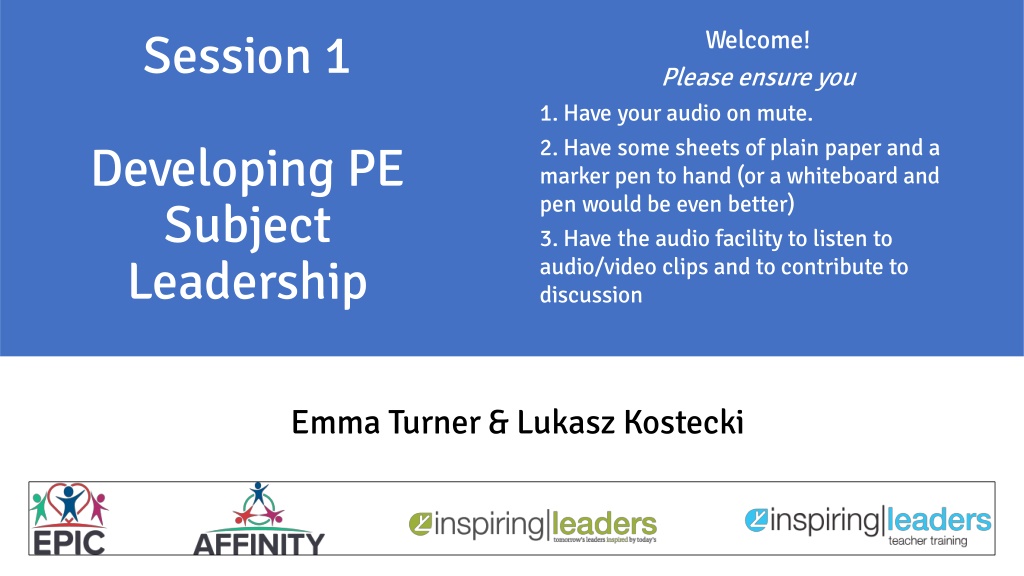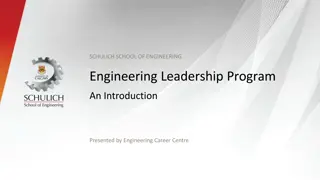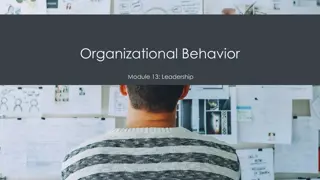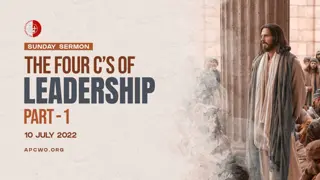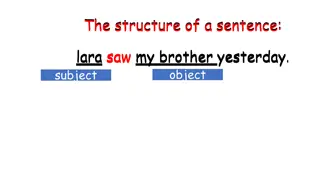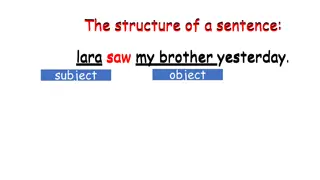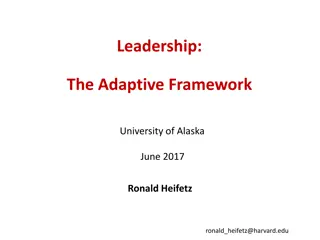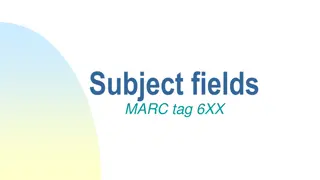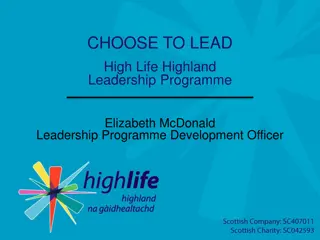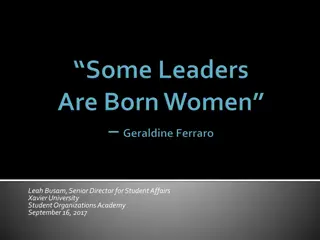Developing PE Subject Leadership Course Overview
This course aims to enhance subject leadership skills in Physical Education, focusing on leadership development, exploring the role of subject leaders, and improving outcomes for pupils. Participants will reflect on their leadership stage, revisit the core purpose of subject leadership, and develop tools for school improvement. The curriculum landscape and expert insights provide context for understanding subject leadership challenges and opportunities.
Uploaded on Sep 26, 2024 | 0 Views
Download Presentation

Please find below an Image/Link to download the presentation.
The content on the website is provided AS IS for your information and personal use only. It may not be sold, licensed, or shared on other websites without obtaining consent from the author. Download presentation by click this link. If you encounter any issues during the download, it is possible that the publisher has removed the file from their server.
E N D
Presentation Transcript
Session 1 Welcome! Please ensure you 1. Have your audio on mute. 2. Have some sheets of plain paper and a marker pen to hand (or a whiteboard and pen would be even better) 3. Have the audio facility to listen to audio/video clips and to contribute to discussion Developing PE Subject Leadership Emma Turner & Lukasz Kostecki
Session 1 Developing PE Subject Leadership Emma Turner & Lukasz Kostecki
To improve outcomes for pupils through effectivesubject leadership Aims of the course To reflect on our own stage of leadership, and leadership development To provide opportunities to explore the role of subject leader To revisit the core purpose of subject leadership To develop overview of how to lead whole school improvement To develop a set of tools and behaviours which enhance effective subject leadership To develop wider supportive networks of colleagues
How long have you been PE Subject Lead?
What are the positives about subject leadership? What are any worries/concerns you may have about subject leadership?
Sam Twiselton (DfE Expert Panel Lead) Teacher training will produce new generation of curriculum thinkers. ECF greater focus on how what they teach fits into the whole school curriculum TES 22nd May 2019 Amanda Spielman There is no need to rip up your current curriculum and start again or to produce documents to evidence curriculum thinking The national curriculum will provide the starting point for most schools. Schoolsweek May 17th 2019
Thinking about our subject area Describe your subject
Purpose of study A high-quality physical education curriculum inspires all pupils to XXXXXXX and XXXXX in XXXXXXXX XXXXXXXX and other XXXXXXXXX XXXXXXX XXXXXXX. It should provide opportunities for pupils to become physically XXXXXXXX in a way which supports their XXXXXX and XXXXXX . Opportunities to XXXXXXX in XXXXXX and other XXXXXXX build XXXXXXX and help to embed XXXXX such as XXXXXXX and XXXXXX. Aims The national curriculum for physical education aims to ensure that all pupils: develop competence to excel in a broad range of physical activities are physically active for sustained periods of time engage in competitive sports and activities lead healthy, active lives
Purpose of study A high-quality physical education curriculum inspires all pupils to succeed and excel in competitive sport and other physically demanding activities. It should provide opportunities for pupils to become physically confident in a way which supports their health and fitness. Opportunities to compete in sport and other activities build character and help to embed values such as fairness and respect. Aims The national curriculum for physical education aims to ensure that all pupils: develop competence to excel in a broad range of physical activities are physically active for sustained periods of time engage in competitive sports and activities lead healthy, active lives
Action Point One Revisit the National Curriculum overview for your subject area
Action Point One Identify the Key learning points/objectives for each year group/topic
Why do we have subject leaders? (Organisational Structure) 1. Teacher Standards 2. OfSTED inspections Quality of leadership in, and management of, the school 3. Personal and system professional development 4. Wider contribution to the school 5. Distributed Leadership 6. Succession Planning 7. Clarity and Coherence
But why do we have subject leaders? What is their job? But what is the PURPOSE of the subject leader? (discuss)
Whats the point of subject leadership? Is it ? Inspire Accountability Evidence Develop Leadership Skills Support Colleagues Subject Advocacy Improving outcomes for pupils Improve Resourcing Specialist Expertise Troubleshooting
Subject Leader - Definition Subject leaders provide professional leadership and management for a subject. They secure high quality teaching; effective use of resources; and therefore an improved standard of learning and achievement for all pupils.
Who is interested in the outcomes of our role? Pupils Parents/families Classroom based colleagues at all levels SLT Colleagues in other schools (MATs, federations, local clusters) Ofsted, LA, Senior MAT colleagues Us (individuals prof dev) Accountability
Always, Sometimes or Never True? Provides leadership and direction within a subject Is solely responsible for standards in the subject carries the can Ensures practices within their subject improve across the school Supports, guides and motivates colleagues within their subject Maintains, cleans, tidies and fixes resources Observe lessons and make OfSTED graded judgements about the quality of teaching across the school Is expected to be the expert and know everything about their subject Evaluate the effectiveness of teaching and learning within their subject across the school Identifies training needs in their subject across the school Leads INSET Monitors standards of attainment and progress in their subject across the school Carries out independent reading and research to support their own professional development within their subject area Coordinates INSET for all staff within their subject area Will be interviewed by OfSTED and named in an OfSTED report Writes action plans for their subject and self evaluates Reports to governors on standards, progress and attainment in their subject Audits resources and identifies purchasing needs. Researches most appropriate resources. Promotes their subject with parents, families and other stakeholders Manages a budget within their subject Contributes to whole school self evaluation
A 3 part model Intent what we will teach Implementation how we will teach it Impact how much was remembered and can be used effectively (how do we know?) Ofsted Phase 3 findings of curriculum research p21
Milestones of an Art journey Tell a colleague (from memory, not using Google!) as many of the current specific NC Art objectives as you can for each of the year groups below (in which you don t currently or haven t worked) EYFS Y6 Y4 Y7 Y2
Some Extracts - Ofsted Inspectors will primarily consider the curriculum leadership provided by the school, subject and curriculum leaders. The school s curriculum is rooted in the solid consensus of the school s leaders If leaders are able to show they have thought carefully, that they have built a curriculum with appropriate coverage, content, structure and sequencing and that it has been implemented effectively, then inspectors will assess a school s curriculum favourably. Inspectors will draw evidence about leaders curriculum intent principally from discussion with senior and subject leaders.
Before we start to say how we will be monitoring, we need to have a clear picture of where we want to head. TASK What is the strategic direction and vision for your subject? What does your finished product look like? Consider attainment, progress, attitudes, post KS2 implications, adult/life skill relevance, provision, experiences, staffing, resourcing
So, before we can embark on curriculum design we must be crystal clear why we are doing it. We are doing it because exams are not enough, because a knowledge rich curriculum is partial, and to be human is to create, to empathise, to make and to think. Peter Hyman a curriculum of head, heart and hand
Subject Leader KNOWING SUPPORTING MONITORING CHANGING & IMPROVING
What does knowing include? Knowing about the subject Knowing about practice Knowing about resources Knowing about attainment and progress
What does supporting include? Supporting colleagues coaching, induction, mentoring, CPD Supporting teaching Supporting with information and opportunities for involvement
What might monitoring include? Attainment and progress Plans and planning Children s learning, outcomes & attitudes Teaching
Checking in not checking up Checking in not Checking up
TASK TASK Carry out a self evaluation for an initial overview of where you are in your subject leadership journey. Key 1 = Yet to start: No work has been done in this area 2 = Focusing: some work in this area has begun, including a detailed audit and M&E round within the subject 3 = Developing: Following the audit, some areas for development have been identified and work has begun/actions have been taken in this area 4 = Establishing: Much work has been done in this area and there is some evidence to demonstrate that the work has had an impact in one or more areas across the school 5 = Enhancing: This is effectively in place, much work has been done and there is a range of evidence from all areas of the subject across the school which demonstrate positive measurable outcomes.
The story so far Clear picture of the role of subject leader Set an initial vision/strategic direction Begun self evaluation Next Steps?
Today - the story so far Clear picture of the role of subject leader Set an initial vision/strategic direction Begun self evaluation Next Steps? Discuss steps so far with SLT (do they tally?) How does your subject fit into wider M&E and SDP work? What do you need to know? How will you find out? Begin/update action plan
What might excellence in PE look like? Can we define it? Are all staff clear about it? How have we modelled this? Are staff aware of what constitutes excellence in PE provision and achievement?
Can we define it? Can we define it? Planned Schemes of work Progressive Curriculum map Delivered to all pupils Inclusive
How have we modelled this? Observations Observations Staff meetings Staff meetings Team teach Team teach Subject showcase Subject showcase Staff sports Staff sports
Journey of learning games EYFS spatial awareness, different body movement, beginning to develop basic ball skills, beginning to use small equipment KS1 specific and isolated ball skills, developing team based activities, aiming and targeting. KS2: Y3/4 learning specific rules of complex games. Applying known and developed skills in a game situation. KS2: Y5/6 effective use of developed skills and knowledge. Strategic thinking and conscious use of different tactics.
Developing excellence through a coherent curriculum? How might we ensure progression? How do skills, knowledge and attitudes develop? How do we use assessment? What planning models could we use for long term and medium term planning? How do we know we are teaching an excellent curriculum? What should exemplar curriculum planning for PE include and consider?
How might we ensure progression? Effective curriculum map Thoughtful and assessment informed planning Review of expected learning outcomes Frequent assessments
How do skills, knowledge and attitudes develop? How do skills, knowledge and attitudes develop? Dedicated and passionate PE teacher role model Peers role models Peers pressure Challenges and tasks out of comfort zone Cross curriculum links Links between PE and wellbeing and healthy life style
How do we use assessment? On going formative assessment to inform further planning End of unit assessments Termly assessment Take action
How do we know we are teaching an excellent curriculum? Engagement and enjoyment Uptake on competition and after school clubs Participation in competition Links and uptake with local out of school clubs Staff confidence Pupils survey
What should exemplar curriculum planning for PE include and consider? What to consider? -DfE guidelines -Include broad range of sports -Season -Competition calendar -Pupils voice -Staff competency
Welcome! Please ensure you Questions 1. Have your audio on mute. 2. Have some sheets of plain paper and a marker pen to hand (or a whiteboard and pen would be even better) 3. Have the audio facility to listen to audio/video clips and to contribute to discussion
